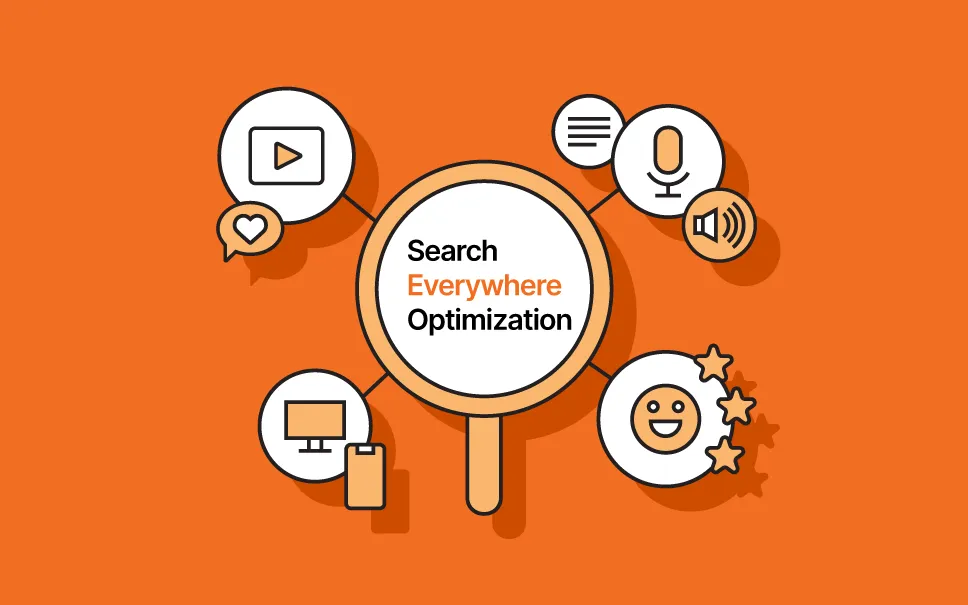Searchable content has completely transformed how we navigate the internet, starting way back with the introduction of the first search engine, Archie, in 1990. Archie paved the way for others like Altavista and MetaCrawler, and eventually, the big names we all know today—Yahoo and, of course, Google. These platforms didn’t just change how we find information online; they made searchable content a fundamental part of the digital experience.
As search engines evolved, so did the need for content that could actually be found by users.
In the early days, just having content online was enough to get noticed. But as the internet became more crowded and search algorithms got smarter, creating optimized, searchable content became essential.
What is Searchable Content?
Searchable content refers to digital material that’s optimized to be easily discovered through search engines.
Unlike content that relies on social media algorithms to reach an audience based on browsing habits, searchable content is designed to meet specific search queries.
This type of content closely aligns with user search intent, meaning it answers the questions or solves the problems people are actively searching for. It’s usually optimized with relevant keywords, clear structure, and valuable information that not only helps it rank higher in search engine results pages (SERPs) but also provides immediate value to the user.
The Rise of SEO and Google’s Impact
The introduction of Google marked a major turning point. Google’s focus on relevance and quality pushed content creators to rethink their strategies, emphasizing not just the right keywords but also delivering content that effectively answers user queries. This shift was crucial because it recognized that people weren’t just searching for random terms—they were looking for specific answers, solutions, and insights.
Today, the stakes are even higher. With the rise of artificial intelligence, search engines and digital assistants are getting better at understanding and processing natural language. This means that content must be not only keyword-rich but also contextually relevant and aligned with search intent. People expect immediate, accurate results, and the content that meets these expectations is the content that thrives.
Moreover, the rise of AI-driven search technologies, like Google’s Search Generative Experience (SGE), is changing the game again.
SGE offers users quick, clear overviews of search topics using generative AI, often without requiring them to click on individual webpages. This evolution highlights the importance of not just creating searchable content but optimizing it so thoroughly that it can be effectively used by both traditional search engines and these emerging AI tools.
In this ever-evolving landscape, searchable content is no longer just a strategy—is key for your business. It’s about creating material that’s easily discoverable, highly relevant, and designed to engage users from the moment they hit the search button. As we move forward, the role of SEO in ensuring that content is visible to both humans and AI will only continue to grow in importance.
Keyword Research: The First Step to Creating Searchable Content
The foundation of any successful searchable content strategy is thorough keyword research.
This process involves identifying the specific terms and phrases your target audience is searching for online. By understanding these search patterns, you can tailor your content to meet their needs.
Several tools can help with keyword research. These platforms normally allow you to see search volume and competition levels and even suggest related keywords that can further enhance your content. The goal is to balance highly relevant keywords with those that have a reasonable level of competition, ensuring your content can realistically rank well.
For example, if you’re creating content about “best sunscreen for sensitive skin,” you might explore related keywords like “hypoallergenic sunscreen,” “mineral sunscreen for sensitive skin,” and “SPF for eczema-prone skin.” These related terms can be strategically used throughout your content to capture a broader audience who are searching for similar solutions.
Content Optimization: Best Practices to Attract Organic Traffic
Once you’ve identified the right keywords, the next step is to optimize your content effectively. This involves using your selected keywords strategically within titles, headings, and throughout the body text. But beware of keyword stuffing—overloading your content with keywords can harm readability and potentially lead to penalties from search engines.
- Strategic Use of Keywords: Start by incorporating your primary keyword in the title of your content and use variations or related terms in subheadings. This not only signals to search engines what your content is about but also helps readers quickly understand the topic.
- Content Structure and Format: A well-organized structure with clear headings, bullet points, and short paragraphs enhances readability. Users are more likely to stay on a page that’s easy to navigate, and search engines reward content that provides a good user experience. Including images, infographics, and videos can also make your content more engaging and shareable.
- Readability and User Experience: Tools like Hemingway Editor or Grammarly can help ensure that your content is easy to read. A clean, simple design paired with optimized content not only improves the user’s experience but also increases the likelihood that they’ll return to your site in the future.
Searchable Content vs. Interest-Based Content: Key Differences
Searchable content and interest-based content serve different purposes, and understanding the distinction between the two can significantly impact your content strategy.
- Searchable Content: As mentioned, this type of content is created with the intent of being discovered through search engines. Users actively look for this information, often because they have a specific question or need. For instance, someone searching “how to create SEO-friendly content” is likely seeking a detailed guide or tips on improving their content’s searchability.
- Interest-Based Content: On the other hand, interest-based content is typically surfaced through algorithms on platforms like Instagram or TikTok. This content is tailored to a user’s browsing behavior, showing up in their feed based on past interactions. For example, if you watch a cooking video on Instagram and engage with it, the algorithm may show you similar content, such as other recipe videos.
An example from your experience illustrates this perfectly: when your mother-in-law sends you a recipe video featuring yuca, and you engage with it, Instagram’s algorithm takes note and starts filling your feed with more yuca recipes. This highlights how interest-based content is designed to keep users engaged with similar content rather than meeting a specific search intent.
FUN FACT: Did you know Yuca is Cassava in Spanish? That’s where we got our name!
SEO and Conversions: How Good Searchable Content Can Boost Your Sales
Effective SEO goes beyond just getting users to your site—it plays a crucial role in driving conversions. When your content is optimized for search intent, it aligns closely with what potential customers are looking for. This means that when a user finds your site through a well-optimized piece of content, they are already primed and ready to take action, whether it’s making a purchase, signing up for a newsletter, or contacting you for more information.
A user searching for “best espresso maker,” for example, is likely in the decision-making stage. If your content is optimized and ranks well for this query, the visitor is more likely to convert because they’re actively seeking a solution that your product or service can provide.
From your personal experience, you know that a well-optimized piece of content can swiftly move a user from one stage of the customer journey to the next. This not only enhances the user’s experience but also directly impacts your bottom line.
Tools and Resources for Creating Searchable Content
To excel in creating searchable content, leveraging the right tools is essential.
Here’s a list of recommended tools that can help you optimize your content for search engines:
- Google Keyword Planner: Ideal for finding keywords and analyzing search volume. The best part? It’s based on Google’s own database and is completely free!
- Answer The Public: This tool helps you understand what questions people are asking about a specific topic, giving you valuable insights into user intent.
- Semrush: A comprehensive tool for keyword research, site audits, and competitive analysis, making it a go-to for many SEO professionals.
- Ahrefs: Known for its powerful backlink analysis, it also provides robust keyword research tools to help you stay ahead of the competition.
- Ubersuggest: Offers keyword suggestions and SEO insights at an accessible price point, making it a great option for those on a budget.
These tools not only assist in keyword research but also provide insights into what your competitors are doing, helping you stay ahead in the content game.
The Power and Evolution of Searchable Content
Searchable content is a powerful tool in digital marketing, particularly when combined with a deep understanding of SEO and user intent. By optimizing your content for search engines and making it valuable to your audience, you can significantly enhance visibility, attract targeted traffic, and ultimately boost conversions.
As the digital landscape evolves, staying ahead of trends in search behavior and content optimization will be essential. By focusing on the right strategies, utilizing effective tools, and consistently delivering genuine value, your content can attract visitors and convert them into loyal customers.
Embracing the power of searchable content goes beyond just following SEO best practices—it’s about truly understanding your audience’s needs and providing the right content at the right time. With this approach, you’ll be well-equipped to thrive in the increasingly competitive online space.




